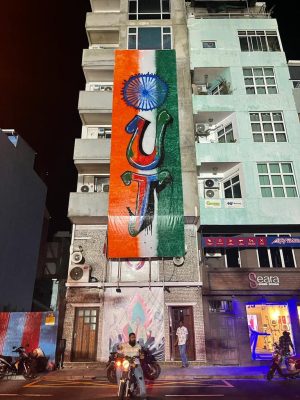On April 21, Maldivian President Ibrahim Solih issued a decree banning the opposition’s “India Out” campaign. The presidential order came after the country’s National Security Council decided that the campaign “to incite hatred against India” is a “threat to national security.”
In his order, the Maldivian president described the anti-India protests as an “organized campaign that intends to disrupt the longstanding bilateral relations between Maldives and India” as well as peace and security in the region. He also argued that the “India Out” campaign puts Maldives at risk of instability, “huge economic and social burden, and isolation in the international arena.” Not acting to prevent this would make it difficult for Maldives to safeguard its independence and the lives of its nationals living or travelling abroad and of foreigners living in the archipelago, the presidential order said.
The India Out campaign began in 2020, when protests led by the opposition Progressive Party of Maldives (PPM) and the People’s National Congress (PNC) erupted on the streets of the Maldivian capital, Malé, and in social media against the alleged presence of Indian military personnel on Maldivian soil.
The campaign received a shot in the arm in December last year when former President Abdulla Yameen, who heads the PPM, took over the reins of the campaign after being freed from imprisonment on charges of corruption. Yameen is regarded by many in the Maldives and India as a pro-China leader. During his time as Maldives’ president, the archipelago’s foreign policy tilted heavily in Beijing’s favor.
Opposition parties insist that they are not opposed to India but are against the Solih government “selling off the Maldives” to India and allowing New Delhi a military presence in the archipelago. The Maldivian foreign and defense ministries have denied the allegations. The opposition has provided no evidence so far to substantiate its claims.
It is hard to dispel the feeling that the India Out campaign is really aimed at weakening the Solih government and the ruling Maldivian Democratic Party (MDP) ahead of elections next year.
Stirring anti-India sentiment over sovereignty issues is a potent way for democratic and authoritarian regimes, and ruling and opposition parties, in India’s neighboring countries to mobilize people’s support. The PPM is now using this time-tested strategy to rally the Maldivian masses against the Solih government. Yameen is using the campaign as his re-election vehicle.
Whatever the India Out campaign’s motivation may be, a ban on the campaign is problematic for several reasons. For one, it is anti-democratic as non-violent protests are vital for the functioning of a democracy. The MDP itself emerged from mass protests that it led in the 2000s against Maldives’ authoritarian President Maumoon Abdul Gayoom. The MDP-led protests culminated in Maldives’ emergence as a multiparty, presidential democracy in 2008.
Solih’s decision to issue a decree is problematic too. He was forced to do so after efforts to get parliament to enact a ban on India Out ran into trouble.
Early this year, the MDP circulated a draft legislation “to hinder and stop any actions that could have a negative effect on the Maldives’ relations with foreign countries.” The bill criminalized demonstrations. Although the MDP has a strong presence in parliament, several of its parliamentarians were opposed to the bill. Apprehensive that it might not muster the requisite support in parliament, the government set the bill aside.
By opting for a decree, Solih in effect circumvented the parliamentary route to stop the India Out campaign.
The decree has galvanized the opposition parties further.
They have rejected the allegations that they are engaging in hate speech and have slammed Solih for a decree which “under the pretext of protecting national security” “suspend[s] the people’s right to freedom of expression in voicing [their opposition] against the illegal stationing of Indian military forces in the Maldives.”
“This marks a dark day in the history of the Maldives as for the first time a sitting president has actively elected to abandon his own people and protect the interests of a foreign military,” said a statement by the opposition Progressive Congress Coalition.
The opposition is challenging the decree in court.
Additionally, its activists are devising new ways to remain several steps ahead of the police, who are seeking to enforce the decree. When banners proclaiming the “India Out” slogan were removed from homes and offices of PPM leaders, others with the words “In Dear Out” surfaced in Malé. Opposition activists have turned to graffiti and pamphlets to get their India Out message across to the people.
The coming weeks and months will not be easy for the Solih government. In addition to a galvanized opposition, Solih will have to deal with challenges from within his government. There are many in the MDP who are opposed to the India Out campaign but critical of the decree banning it.
The rift between Solih and MDP chief and Speaker of Parliament Mohammed Nasheed, a former president, can be expected to widen. The India Out bill was a Nasheed initiative and his supporters believe that Solih issued a decree to ban the India Out campaign to wrest the issue out of Nasheed’s hands. The possibility of Nasheed supporters opposing the decree cannot be ruled out.
This infighting could cost the MDP dearly.

































